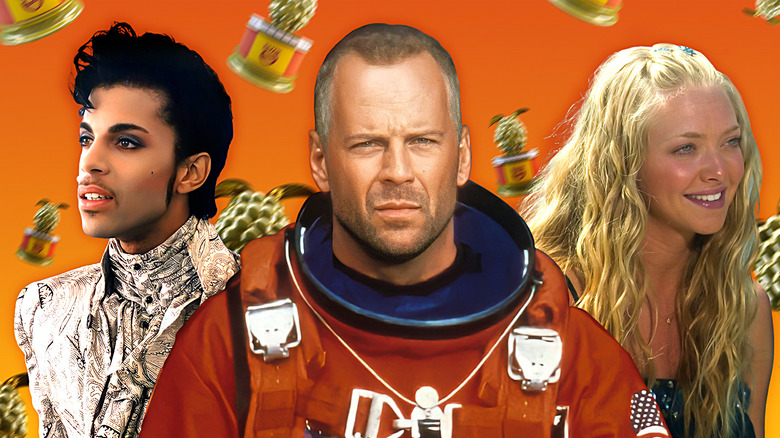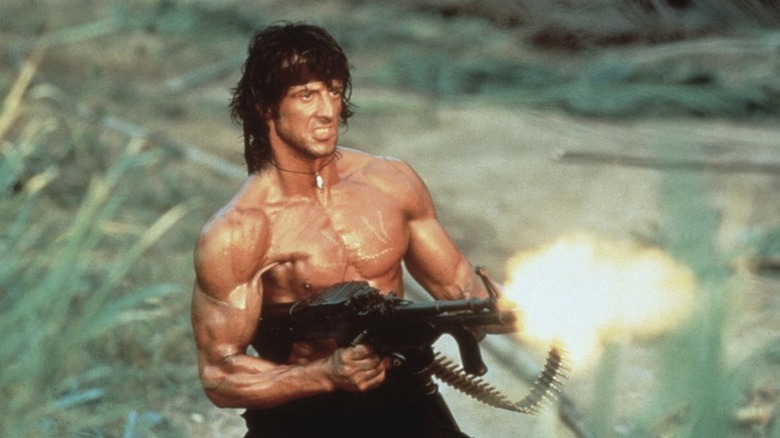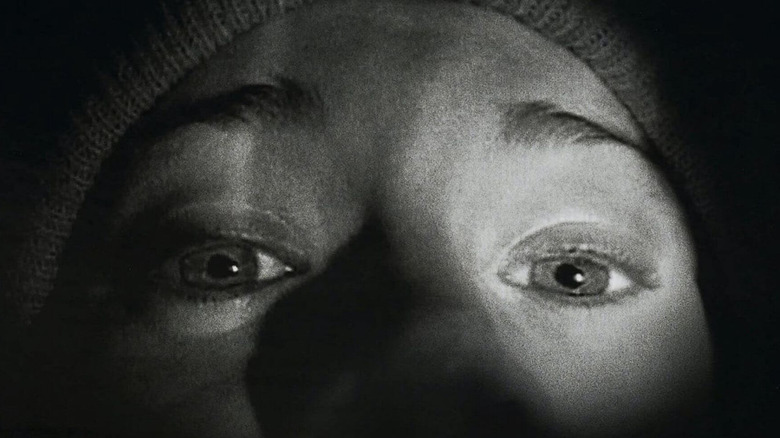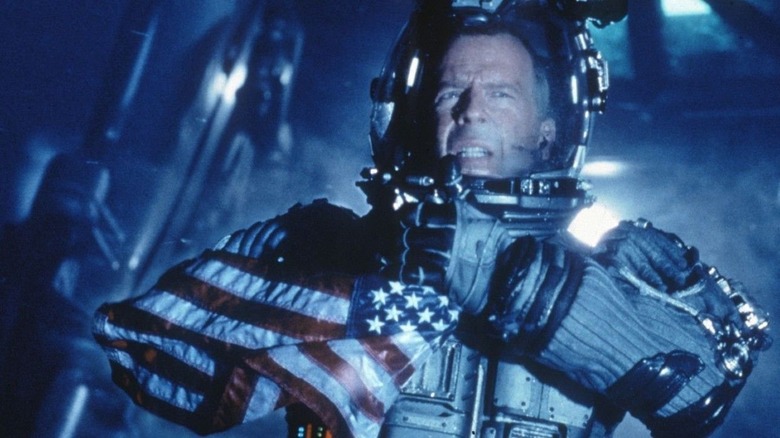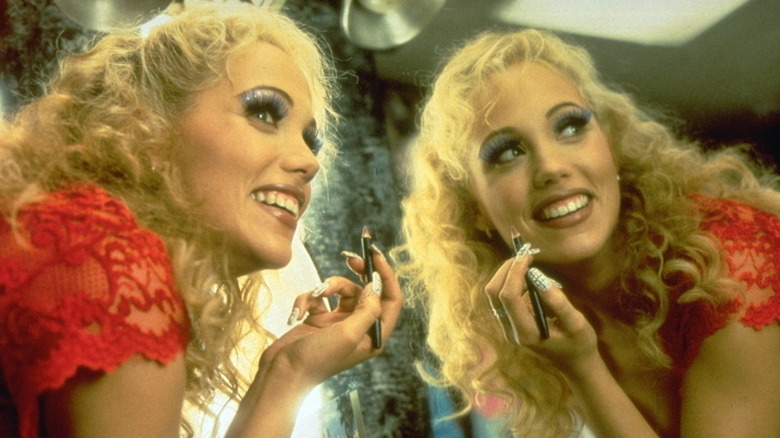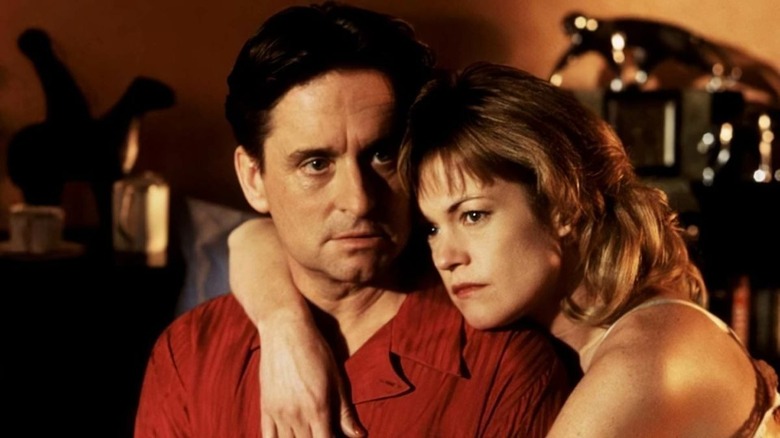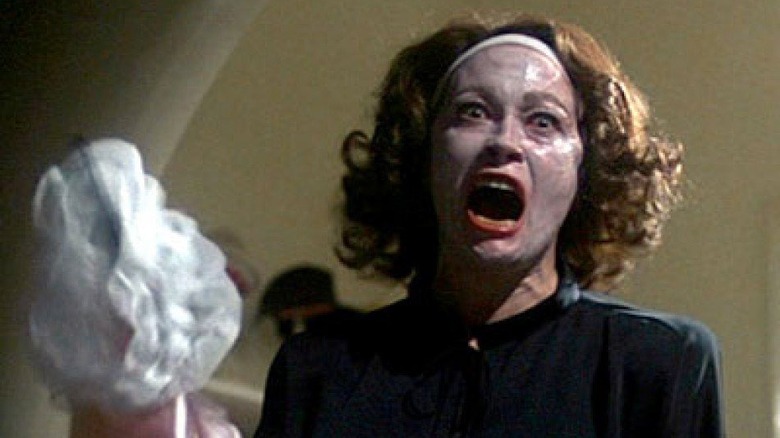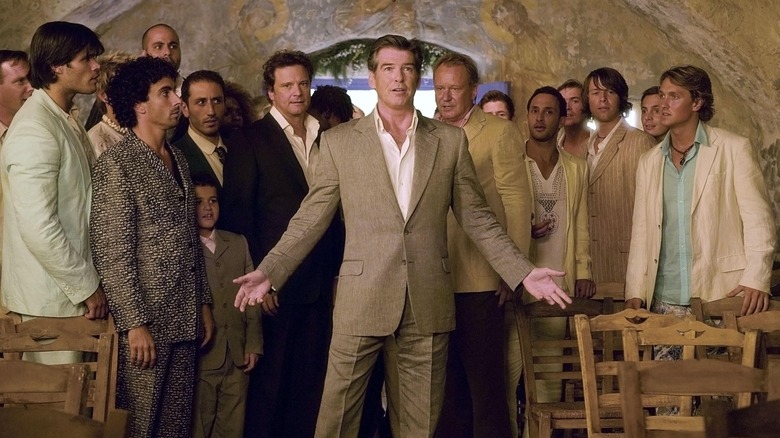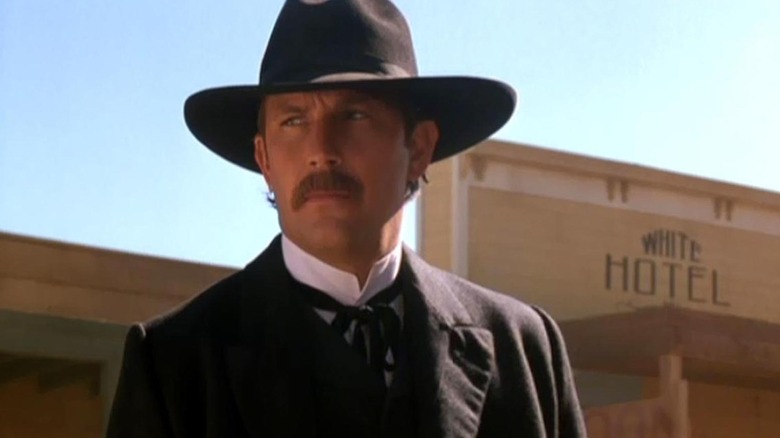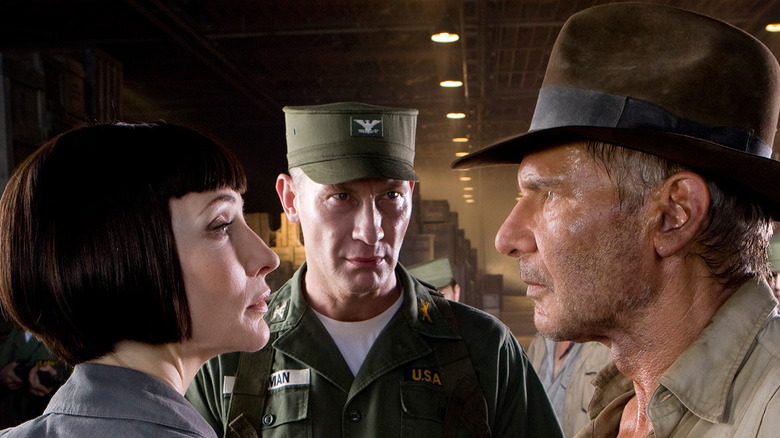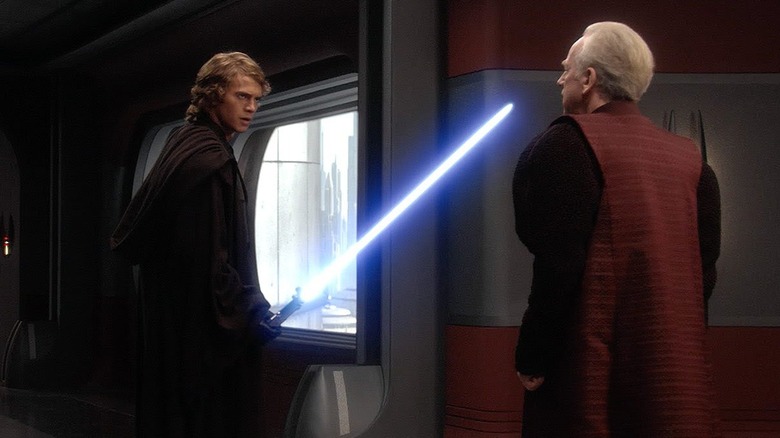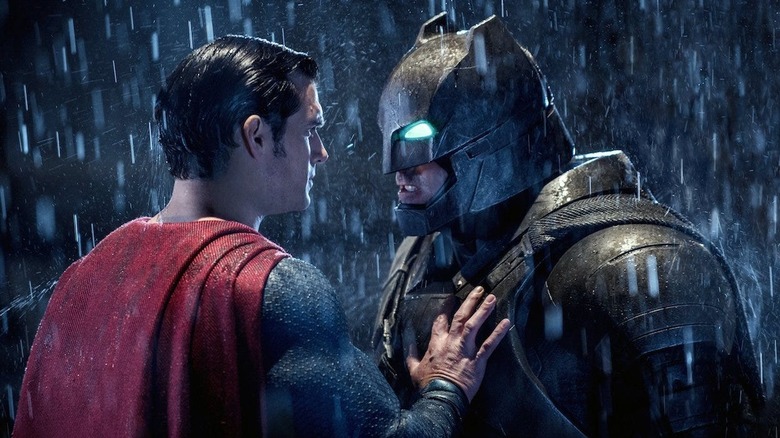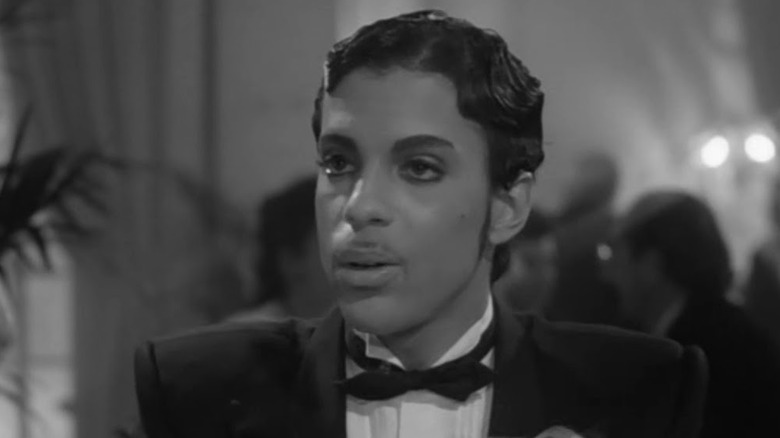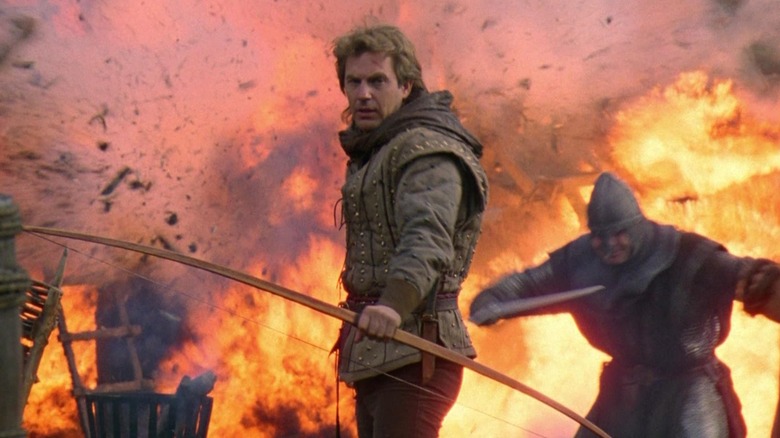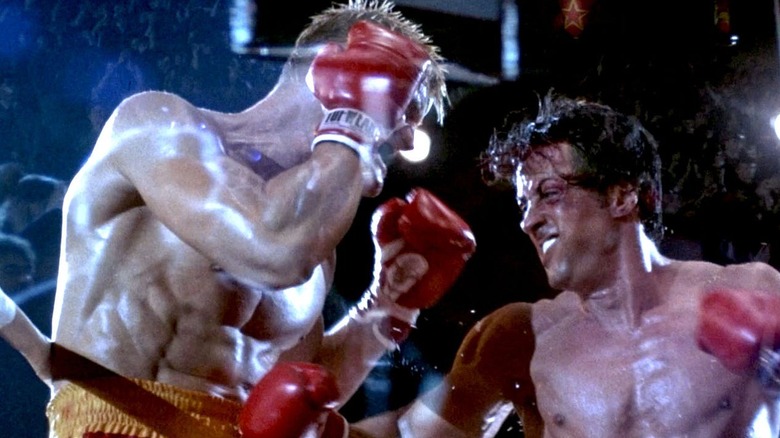Razzie Award-Winning Movies That Are Actually Worth Watching
It is the most eagerly anticipated awards show of the year (or so they say). Yet while film fans eagerly await it, filmmakers never want to be nominated for one of its awards, let alone win. Of course, we're referring to the Golden Raspberry Awards, or the "Razzies" for short.
Since the Razzies first bestowed their less-than-coveted award nearly half a century ago, Hollywood's brightest stars have dreaded "winning" their parody prize. You see, the Razzies don't reward the best of the best; they condemn the worst of the worst: films whose cinematic sins are so beyond absolution they warrant a fate far worse than rotten tomatoes — they deserve, well, golden raspberries.
Much like the Academy Awards they lampoon, the Razzies haven't always gotten it right. Their global cabal of movie critics, film buffs, and people who pay $40 a year have had many misfires across numerous categories in their 40-plus years. So we're going to give these Razzie recipients the long-due redemption they deserve. We're not saying these movies or performances are great; but some of them are unambiguously good, while all are at least worthy of watching. The Razzies were cruel, but history has been kind to these movies. Here's why you should give them a chance.
Rambo: First Blood Part II
"Do we get to win this time?" John Rambo famously asked his mentor Colonel Sam Trautman in 1985's "Rambo: First Blood Part II." We don't think he was talking about the four Razzies the "First Blood" sequel, ahem, "won."
The second of five "First Blood" films featuring America's favorite PTSD-stricken, one-man killing machine, "Rambo" received seven nominations, taking home the top (or bottom?) prizes of worst picture, worst actor (Sylvester Stallone, tying with himself for "Rocky IV"), worst screenplay, and even worst original song (from Sly's bro, Frank). While critics savaged the pic then and now, moviegoers have been far more kind, not only giving "Rambo" strong reviews, but buying enough tickets to make it the second-highest grossing film of 1985.
Maybe Razzie voters were bigger fans of the somber tone of "First Blood"? Or maybe we've just been desensitized by the far inferior sequels and ripoffs that "Rambo" has inspired in the past four decades? Whatever the reason, we're with the film's fans. As one of the '80s best action movies, the Razzies got it wrong about "Rambo: First Blood II."
The Blair Witch Project
With earnings of $248 million worldwide on a $600,000 budget, "The Blair Witch Project" is one of the most profitable movies of all time. If you happened to be consuming pop culture at the time, you also know that it was one of the most parodied and ripped-off movies of the era, or any era, second only to "The Matrix." What the Wachowskis did with "wire-fu," the filmmakers behind "Blair Witch" did with shaky found footage films, launching dozens of imitators and untold thousands of bottles of Tylenol.
Everybody was into "Blair Witch" in the late '90s and early 2000s ... except for the Golden Raspberries, which nominated the 1999 horror film for worst picture (c'mon), and awarded Heather Donahue as worst actress (C'MON!)
"The Blair Witch Project" is not only one of the most influential horror films ever, it's one of the best. Donahue's compelling performance as a horror-stricken film student convinced us she was being stalked by an unseen evil. Who can forget the film's most famous scene (which launched a thousand memes) of Donahue saying "I am so scared!" through terror-ridden tears? We were bewitched by "The Blair Witch Project," even if the Razzies weren't.
Armageddon
John McClane is Bruce Willis' signature role, but his second greatest character is Harry S. Stamper, the hero of Michael Bay's criminally underrated summer blockbuster, "Armageddon." It's also one of three roles (out of 16 nominations!) that "won" Willis a worst actor prize at the Razzies — all in the same year, no less. Yep, Willis tied himself for worst in 1998, winning for "Armageddon," "Mercury Rising," and "The Siege." We suspect the Razzies were just being cheeky, because Willis definitely didn't deserve a Razzie for "Armageddon."
Only Bruce Willis could anchor the abject absurdity of an Earth-smashing, Texas-sized asteroid being stopped by a team of untrained, unruly roughnecks-turned-astronauts with nothing but his signature sunburnt squint and snarky one-liners. Sure, Billy Bob Thornton and Steve Buscemi chewing scenery like a Slim Jim helped, but it's Willis' Joe Schmo machismo that makes "Armageddon" such a rocking (pun intended) good time.
What makes it even worse is Willis was the only "winner" out of seven nominations for "Armageddon." Go after Ben Affleck, he deserves it, but give the world's best deep core oil driller the kudos he deserves.
Showgirls
With 10 nominations and five trophies, "Braveheart" was the big winner at the 1996 Academy Awards, while the big loser at the 1996 Razzies was a very different movie: "Showgirls." It received 13 nominations and shimmied away with seven awards, including worst picture, worst director (Paul Verhoeven), and three awards for Elizabeth Berkley (worst actress, worst new star, and worst on-screen couple). Tell us how you really feel, Razzies.
"Showgirls" was so reviled that the Razzies continued to kick its dead corpse years later, giving it worst picture of the decade in 2000 and nominating it for "worst 'drama' of our first 25 years" in 2005 (which went to "Battlefield Earth"). Besides that, "Showgirls" also effectively killed three Hollywood careers — those of Berkley, Verhoeven, and screenwriter Joe Eszterhas. It does not get much worse than that.
Naturally, it's recently gotten a critical reappraisal, but this isn't just internet film culture being contrary; it's actually warranted. If "Braveheart" was peak Mel Gibson, then "Showgirls" was peak Paul Verhoeven, a meta-commentary that satirizes the same sexploitation it celebrates. What Verhoeven's "Robocop" was to '80s excess and "Starship Troopers" was to military fetishism, "Showgirls" was to the ribald, raunchy, and ridiculous world of show business. This carries extra weight in a post-Weinstein world. Maybe Hollywood hated "Showgirls" so much because it was looking at itself?
Shining Through
Some Razzie award winners have stood the test of time as all-time turkeys ("Gigli," "Cats"), while others have met a far worse fate — they have faded into obscurity. "Shining Through" falls into the latter category. If you have actually heard of this movie, let alone seen it, we'd be surprised, as you'd have to dig really deep into Walmart's $5 DVD bin to find this 1992 clunker. Yet it cleaned house at the 1993 Razzies, with five nominations and three "wins," for worst picture, worst director (David Seltzer), and worst actress (Melanie Griffith).
In a clear play on Alfred Hitchcock's masterful "Notorious," "Shining Through" stars Griffith as a New York socialite who goes behind enemy lines for Douglas' secret agent during World War II, only for the two to fall in love. There's something admirable about its effort to replicate old-school Hollywood, studio era-style filmmaking, even though its reach far exceeds its grasp. In any event, "Shining Through" was released the same year as "Encino Man" and "Stop! Or My Mom Will Shoot" (which weren't even nominated for worst picture), so it definitely didn't deserve the Golden Raspberry.
Mommie Dearest
With three Academy Awards nominations and one win (best actress for 1977's "Network"), Faye Dunaway probably saw more Oscars in her future for 1981's "Mommie Dearest." After all, there's nothing Hollywood adores more than movies about Hollywood, so an "Oscar darling" like Dunaway playing Tinseltown titan Joan Crawford screamed "Oscar bait." Alas, Dunaway's performance just screamed, period.
Based on Christina Crawford's best-selling memoir about her wicked superstar mother, "Mommie Dearest" became legendary for all the wrong reasons. The Razzies beat "Mommie Dearest" with a wire hanger, with nine nominations and five awards, including worst picture and worst actress, which Dunaway shared with Bo Derek in "Tarzan the Ape Man." The Razzies came back for more, naming "Mommie Dearest" the worst picture of the decade in 1990.
Dunaway's dedicated if undisciplined performance describes "Mommie Dearest" itself, a film whose earnestness is undermined by its audacity. It's strange watching a would-be Oscar contender play like a made-for-TV melodrama. But beneath the film's frantic fury is a gloriously over-the-top camp classic. No, "Mommie Dearest" didn't belong on the Oscar stage, but it does deserve a spot in your streaming queue.
Mamma Mia!
The only fanbase more passionate (and frankly, frightening) than "Swifties" are the "Goldies" and "Mouldies" who worship at the altar of ABBA. So the Razzies were playing with fire when they gave Pierce Brosnan worst supporting actor for his role as one of Meryl Streep's would-be baby daddies in the 2008 musical comedy, "Mamma Mia!"
Brosnan earned the film's sole Razzie nomination, which must have been extra embarrassing, considering he "beat" Burt Reynolds' double nom for "Deal" and "In The Name of the King: A Dungeon Siege Tale" as well as Uwe Boll as himself in "Postal." Brosnan worse than Boll? Get outta here!
Granted, watching James Bond pretending he can dance and fly high can be a bit cringe if you're expecting Fred Astaire or Gene Kelly. But it's not enough to derail this joyfully jubilant jukebox musical. Heck, that's part of what makes "Mamma Mia!" such a charmingly campy time: nobody is a Broadway-level singer and dancer. Yet everyone is ABBA-solutely having the time of their lives.
Wyatt Earp
Picture this: a Kevin Costner vanity project disguised as a three-plus hour Western epic. Nope, we're not talking about "Dances With Wolves," but "Wyatt Earp." While the former swept the Oscars in 1991, the latter was shot up worse than the Clanton gang at the O.K. Corral by the Razzies in 1995. What a difference a few years can make, huh?
Out of five nominations, "Wyatt Earp" rode off into the sunset with two "wins," for worst actor (Kevin Costner) and worst remake or sequel. The overstuffed film had the misfortune of being overshadowed by the far superior "Tombstone," which came out a year earlier, and remains the definitive take on Wyatt Earp next to John Ford's "My Darling Clementine." But weighing "Wyatt Earp" on its own merits, it's still a solid entry in one of the greatest American genres that is now, sadly, in retreat.
Sure, it's another glorified star vehicle from Costner, but that could describe most of his movies. It doesn't deserve to be called the "worst" of anything, especially not with Dennis Quaid chewing scenery like tobacco as "Doc" Holliday, making us almost forget Val Kilmer's iconic take on the character. Almost.
Indiana Jones and the Kingdom of the Crystal Skull
When was the last time you watched "Indiana Jones and the Kingdom of the Crystal Skull"? If your answer is "uh, was that the one with Shia LaBeouf?", you need to give this underrated romp a rewatch.
Maybe this is just the "Dial of Destiny" hangover talking, but "Crystal Skull" isn't that bad. In fact, it's an entertaining B+ movie with an A+ blockbuster budget. Sure, the "nuke the fridge" scene bordered perilously close to a "jump the shark" moment, while the aliens bursting out of a pyramid felt like watching History Channel at 11 p.m. But when you look past the groan-inducing moments, you'll find a perfectly acceptable globe-trotting, rip-roaring action-adventure film that suffers mostly because it followed one of the greatest trilogies ever.
It certainly didn't deserve its Razzies for worst prequel, remake, rip-off, or sequel, considering it came out the same year as "The Mummy: Tomb of the Dragon Emperor," which somehow wasn't even nominated. We won't say it's a masterpiece like "Raiders of the Lost Ark" or "Indiana Jones and the Last Crusade." Heck, we won't even say it needed to be made (though its $786 million worldwide is a franchise high, unadjusted for inflation). We'll just say "Crystal Skull" deserves better, because it's always fun to see Harrison Ford to don the fedora.
Star Wars Episode III -- Revenge of the Sith
Despite earning $2.5 billion worldwide (or roughly one "Avatar" movie), the "Star Wars" prequel trilogy didn't receive much love from fans or critics. But there's recently been a shift. Maybe fans were too harsh at the time because they compared it to the near-perfect original "Star Wars" trilogy; or maybe they're being too generous now because of the directionless Disney "Star Wars" sequel trilogy, which felt like it came off the corporate content mill. Whatever the reason, people have warmed up to the prequel trilogy.
That includes love for one of the most derided parts of the prequels, Hayden Christensen's performance as Anakin Skywalker, which "won" Razzies for both "Attack of the Clones" and "Revenge of the Sith." Admittedly, Christiansen was more wooden than the forests of Endor, but just about everyone in that franchise was. Could any actor make "I don't like sand" work?
Yet for all of Christensen's (and the films') flaws, fans still were so smitten that they celebrated his return in "Obi-Wan Kenobi" and "Ahsoka" on Disney+. Hey, Christensen may have been awkward as Anakin, but he was real and committed, and that matters in any galaxy, especially one far, far away.
Batman v Superman: Dawn of Justice
"Batman v Superman: Dawn of Justice" didn't just get kryptonite from critics and fall short of its billion dollar box office expectations. It didn't just effectively kill off the DC Extended Universe as a viable competitor to the monocultural monolith known as the Marvel Cinematic Universe. It also brought four Razzie awards out of eight nominations to the Hall of Justice, such as worst supporting actor for Jesse Eisenberg, worst on-screen couple for Henry Cavill and Ben Affleck, worst screenplay, and worst prequel, remake, rip-off or sequel. Not good. And yet, we're defending it.
As a long-awaited franchise entry starring two of the most famous pop culture characters ever, "Batman v Superman" was a failure. As a cinematic "elseworlds" tale from "visionary director" Zack Snyder that operates on a wavelength unlike any comic book movie before or since, it's in a category of its own.
If the "Dark Knight" trilogy was Wagnerian opera and the MCU is crowd-pleasing pop rock, "Batman v Superman" is Swedish death metal. It hits with all the subtlety of Batman swinging Superman around, but there's an entire internet subculture of "Snyder Bros" who will defend it to the death, as well as more mainstream outlets who preach its merits. No, we're not saying #RestoreTheSnyderverse; we're saying that its bold, brash, and unrelenting vision is definitely worth watching.
Under The Cherry Moon
Not to "Purple Rain" on any Prince fan's parade, but The High Priest of Pop wasn't perfect. So while his 1984 film and concept album "Purple Rain" remains His Royal Badness' masterpiece, the weather was much rougher "Under The Cherry Moon." The 1986 musical comedy-drama was Prince's directorial debut, so he has nobody else to blame but his bad self for the film sweeping the 1987 Razzies, with eight nominations and five awards. Besides tying "Howard The Duck" for worst picture, Prince "won" worst actor, worst director, and even worst song for "Love or Money!" Prince winning worst song?! Just, wow.
True, this was 100% a pop star vanity project from the "Artist Formerly Known As ____," since there was nobody with the cherries to tell Prince "no" in the mid-1980s. "Under The Cherry Moon" sent Prince crashing back to Earth, but despite its rep, the movie isn't that bad.
Sure, it's a ridiculous romp, but that was kind of the point. Rabid fans who argue The Purple One was way ahead of his time may be stretching it a bit. But with its fiery soundtrack and shameless silliness, even casual Prince buffs can find plenty to love "Under The Cherry Moon."
Robin Hood: Prince of Thieves
There's a reason your mom has such a huge crush on Kevin Costner in "Yellowstone": movie stars don't come much bigger than Costner was in the early 1990s. One year after winning Oscar gold for "Dances With Wolves," Costner starred in "Robin Hood: Prince of Thieves," the third-highest grossing film of 1991.
Yes, this was an era when a star vehicle about OG superhero Robin Hood could make "Batman"-sized money, all thanks to Costner's star power. Yet the Razzies felt Costner's Robin Hood missed the target, giving him worst actor. What were Razzie voters drinking?! Probably Kevin Costner hater-ade, because there's no way he was worse than fellow nominees Bruce Willis ("Hudson Hawk"), Andrew Dice Clay ("Dice Rules") and even Vanilla 'freakin Ice ("Cool As Ice").
Sure, Costner's British accent wasn't super convincing, but he more than made up for it with good, old-fashioned movie star gravitas. If you're going to knock Costner for his accent, you have to knock his "Robin Hood" co-star Sean Connery for maintaining his Scottish brogue in literally every movie. Sorry, but that's just not a world we want to live in.
Rocky IV
Sylvester Stallone had a rough year in 1985. Well, not really: "Rambo: First Blood Part II" and "Rocky IV" were not only the second and third highest-grossing movies of the year, they are still the top-earning entries in their respective franchises.
Alas, the two films were also KO'd by the Razzies. "Rambo" earned seven nominations, "winning" four, while "Rocky IV" earned nine noms, also taking home four. While "Rambo" took bottom honors for worst film, Stallone earned worst director for "Rocky IV," and tied with himself for worst actor, two of the seven acting Razzies he's earned, which is more than any other actor. The only person who maybe fared worse that night was Stallone's then-wife, Brigitte Nielsen, who won Razzies for worst supporting actress and worst new star.
Sorry, but the Razzies are dead wrong on "Rocky IV." Sure, "Rocky IV" is a star-spangled cheesefest, but the fact that it's wrapped in '80s nostalgia like Rocky in Old Glory is part of its charm. We dare even the most hardened cinematic cynic to not chant "Rocky! Rocky!" like the Soviet crowd at the end. Can't be done. Given Stallone has been nominated 32 times and won 11 across multiple categories, including worst actor of the decade (1980s) and worst of the century, maybe Razzie voters just need the eye of the tiger?
